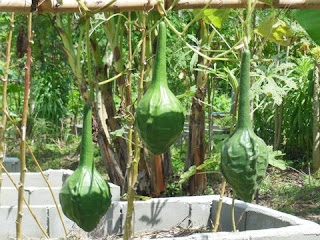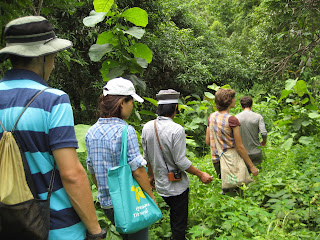 |
| ECHO Asia technical advisor, Dr. Abram Bicksler, carrying out a similar banana multiplication test (results may vary according to banana varieties and locations). |
At the 2011 ECHO
Asia Conference we asked the delegates to share stories describing successful
uses of ECHO's information and resources. The following is one in a series of
posts containing these success stories.
ECHO's activities, from publications to conferences to
seed distribution, all have one goal: getting resources into the hands of
workers on the field so that we can indeed “honor God through sustainable
hunger solutions.” For long-time members of the ECHO network all these
disparate activities really seem unified. Buzz Maxey, of CAMA Services, shared
a few comments with us, illustrating how he has utilized a number of different
ECHO information and resources over the years:
“First, banana propagation
gleaned from EDN
[66]. A lot of my efforts and trials have been a fiasco but I was
successful in this one: peel off 3 layers of the banana stalk, cut off the
leaves, bend stalk over in [the shape of] a number 7. Drive a stake through the
stalk at knee level, dig out a bit at the base of the plant, refill with
compost, and in a few weeks many pups will sprout.
Second, chaya, moringa,
papaya, loquat, and erethrina have all grown well. One farmer has sweet
papaya—50 plants—at 5000 ft. elevation and his 75 head of cattle are eating
chaya.
Third, I have attended four
ECHO conferences and benefited every time. I have been blessed to be with
people of like mind who are impacting the world's poor.” --Buzz
Maxey, October 2011
Buzz Maxey was able to learn about banana multiplication
from an EDN, receive samples of useful species from the ECHO seedbank, and
share encouragement and information at four ECHO conferences. This is just one
example of how ECHO's multiple activities serve the ultimate goal of serving
the poor through sustainable agricultural solutions.
If you'd like more information about rapid banana
multiplication see EDN
66, which Mr. Maxey referenced, and EDN
99, which demonstrates a slightly different technique. Both are available
at ECHOcommunity.org.









































.JPG)











